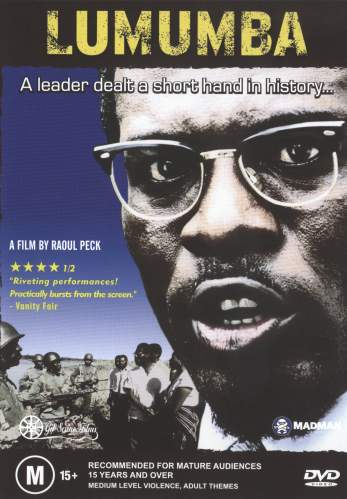Lumumba (2000) |
|
Lumumba (2000) |
|


|
| BUY IT |
| General | Extras | ||
| Category | Drama |
Theatrical Trailer Featurette-Lumumba: Death Of A Prophet Featurette-The Congo: A Brief History Featurette-A Congolese Chronology Notes-Lumumba's Last Letter Trailer-Bowling For Columbine, Power And Terror, Trailer-Manufacturing Consent, Last Party 2000, In Shifting Sands |
|
| Rating |

|
||
| Year Of Production | 2000 | ||
| Running Time | 109:07 (Case: 115) | ||
| RSDL / Flipper | RSDL (91:32) | Cast & Crew | |
| Start Up | Menu | ||
| Region Coding | 1,2,3,4,5,6 | Directed By | Raoul Peck |
|
Studio
Distributor |
 Madman Entertainment |
Starring |
Eriq Ebouaney Alex Descas Théophile Sowié Maka Kotto Dieudonné Kabongo Pascal N'Zonzi André Debaar Cheik Doukouré Oumar Diop Makena Mariam Kaba Rudi Delhem |
| Case | Amaray-Transparent-Secure Clip | ||
| RPI | $34.95 | Music | Jean-Claude Petit |
| Video | Audio | ||
| Pan & Scan/Full Frame | None | French Dolby Digital 2.0 (256Kb/s) | |
| Widescreen Aspect Ratio | 1.85:1 | ||
| 16x9 Enhancement |
 |
||
| Video Format | 576i (PAL) | ||
| Original Aspect Ratio | 1.85:1 | Miscellaneous | |
| Jacket Pictures | No | ||
| Subtitles | English for the Hearing Impaired | Smoking | Yes |
| Annoying Product Placement | No | ||
| Action In or After Credits | No | ||
Normally, if you're like me, you'd watch the feature film on your DVD first, then enjoy the extras like a series of desserts to extend the pleasure of the experience. Right? Well, in this case, unless you're very familiar with your Congolese history of the late 1950s to early 1960s, may I suggest you start with the extras, then work your way through to the film. I tried it my normal way, and felt somewhat disappointed with the film. When I'd gone through the extras, with their archive footage and historical notes, I felt compelled to rewatch the film, and it was as if someone had broken into my house in the interim and completely changed the contents of the feature. Suddenly, it was gripping, compelling and devastating. So, that's a little bit of a tip which you may find of use.
Lumumba tells the story of Patrice Lumumba, the Prime Minister of the Congo immediately after it obtaining its independence from Belgium. Eriq Ebouaney plays the title role and his performance is both dignified and electric, made even more so by his extraordinary resemblance to the historical figure himself. History vilified Lumumba for a long time, and it is only recently that his memory has been revered, and his image reburnished. This is not to say that Lumumba's past was uncheckered. He was a relatively rare breed - an educated Congolese, in spite of the Belgian policy of a colonialisation that was basically benign but intent on "keeping the natives uninstructed." Having been raised at various Christian Brothers Missionary Schools, he had developed a philosophical taste for the likes of Victor Hugo and Voltaire and Rousseau, fostering in him a sensibility for French socialistic beliefs. Following dubious charges of embezzlement from the postal office where he worked as an accountant, he was imprisoned for a year in 1958, and emerged to form the Mouvement National Congolais - the MNC. This organisation had unionism at its heart, but its militant stance and its isolation from the Belgian models of unionism made him immediately the subject of much suspicion.
December of 1959 brought all of this to a head. When the Belgians announced that they were going to hold elections to begin the process of independence, most of the nationalistic groups derided it as a cynical ploy to install Belgian sympathetic puppets into power. Riots broke out and Lumumba was arrested and imprisoned for civil disobedience. But the MNC then made a shifting move. Apparently calling the Belgians' bluff, they put themselves up for election, and won a landslide victory. However, as the MNC and other black political forces were in Belgium at a Round Table discussion of Congo's future, Lumumba was still languishing in jail. Under a flurry of publicity, the MNC refused to enter further discussions without him, and he was summarily whisked out of prison and flown to Belgium with much fanfare, and the ultimate result of being made Congo's first Prime Minister. His president, however, was Joseph Kasavubu (played by Maka Kotto) from an opposing faction who believed in the regionalisation of the Congo - rather than Lumumba's more expansive nationalistic vision.
Perhaps you can see what I mean about the complexities of the story being told. This film is about nobility in the face of futility. Lumumba literally had no hope. The factions within could not agree and the external forces of Europe and North America, gripped in the midst of the Cold War hostilities had many hidden agendas which made the Congo a political toy in their worrying teeth. This film is about treachery and betrayal. Many of those that Lumumba regarded as his friends were to become his executioners as they justified their actions in the face of political or personal expediency. This film is about love. Patrice Lumumba genuinely loved his land and bled and broke for it, only to be vilified wrongly by his countrymen and the world at large. This film is about nobility. Like the stories of Luther King, Ghandi, Mandela, and many many others, Lumumba's is a story of sacrifice to a higher cause. He was aware that his beliefs would cost him his life, but he was compelled to continue, swept up in a cause that was larger than his own need for existence.
This film by Raoul Peck is potent, disturbing, enervating, distressing and haunting. It shows the very worst that humanity will do to itself, and yet proves a triumph of sorts in the very best of what humanity is capable of. It's a difficult film to watch but a thoroughly worthwhile one as well. Challenging but rewarding.
The transfer is presented in an aspect ratio of 1.85:1 16x9 enhanced.
Overall, the quality of this presentation is quite good. The detail in shadow areas is very good and there is no low level noise. There is fine grain and a crisp clean rendering which makes it sharp and bright to view.
The colour palette is exceptional - lush and rich colours abound, all holding well with no evidence of bleeding or posterization.
Aliasing is quite evident throughout this presentation, and almost seems to be a payoff for the crispness elsewhere. Nonetheless, there are few other MPEG artefacts and very few film artefacts to mar the disc.
Subtitles were generally good, although at times a little sparse. Fortunately, one had the option to display the titles or not.
The layer change is extremely subtle and is, according to IfoEdit, at 91:32 in Chapter 15.
| Sharpness | |
| Shadow Detail | |
| Colour | |
| Grain/Pixelization | |
| Film-To-Video Artefacts | |
| Film Artefacts | |
| Overall |
There is one audio track available, French in Dolby Digital 2.0. It is a very clear and well defined track.
Dialogue was very prominent in the speakers and was crisp and clean. The audio sync went very slightly astray, but was not distractingly bad.
The musical score was used to great effect in this film. Jean-Claude Petit has blended almost gothic choral pieces with extraordinarily vibrant African music to create a score that lifts and haunts and wraps around the story with a perfect presence.
The presentation was as directional as a 2.0 soundtrack could offer, and there was judicious use of the subwoofer when merited.
| Dialogue | |
| Audio Sync | |
| Clicks/Pops/Dropouts | |
| Surround Channel Use | |
| Subwoofer | |
| Overall |
The extras on this disc are of particular value, and could only have been enhanced with a commentary track. As I mentioned in the synopsis, you may well find it useful to go through the extras first in this instance to give yourself a clear grounding of the background to the story.
The menu itself is silent, static and simple to navigate.
1:31 long and very accurate in its portrayal of the actual film.
This is a series of features that will truly assist in your appreciation of the feature film. They comprise of:
These are:
This group of clips create a background that goes a long way to introducing Lumumba, his cronies and combatants, and Peck himself as a filmmaker.
2. The Congo - A Brief History
This 4 page text extra gives much of the complex story in background to this time in history. Well written and helpful.
3. A Congolese Chronology
This 8 page text package offers a timeline of major political Congolese events. Informative.
3 pages. The last letter smuggled to Patrice's wife, Pauline. This is a sad and moving message that conveys a powerful relationship between the two and Lumumba's unswerving belief about the actions he had taken.
Trailers for the films:
NOTE: To view non-R4 releases, your equipment needs to be multi-zone compatible and usually also NTSC compatible.
The Region 4 version of this disc misses out on:
The Region 1 version of this disc misses out on:
Both versions are equally good, and there is no compelling reason to prefer one over the other, though the inclusion of the letter on the Region 4 version of this disc is a nice bonus.
A harrowing and challenging watch at many turns, Lumumba is still entirely worthwhile viewing. As an historical figure, Patrice Lumumba still courts controversy, with even the UN weighing in with some fairly hefty criticisms of the man. This portrait is entirely sympathetic, and if that is going to go against your beliefs about Lumumba then you are in for 115 minutes of outrage. If you are, like me, fairly new to the story of the Congo, prepare for a challenging and never simple story about how nationhood can fall into the palms of so few hands, and what power can do in the hearts of humanity. A difficult but worthy film with a good transfer.
| Video | |
| Audio | |
| Extras | |
| Plot | |
| Overall |
| Review Equipment | |
| DVD | Singer SGD-001, using S-Video output |
| Display | Teac 76cm Widescreen. Calibrated with Video Essentials. This display device is 16x9 capable. |
| Audio Decoder | Built in to amplifier/receiver. Calibrated with Video Essentials. |
| Amplification | Teac 5.1 integrated system |
| Speakers | Teac 5.1 integrated system |